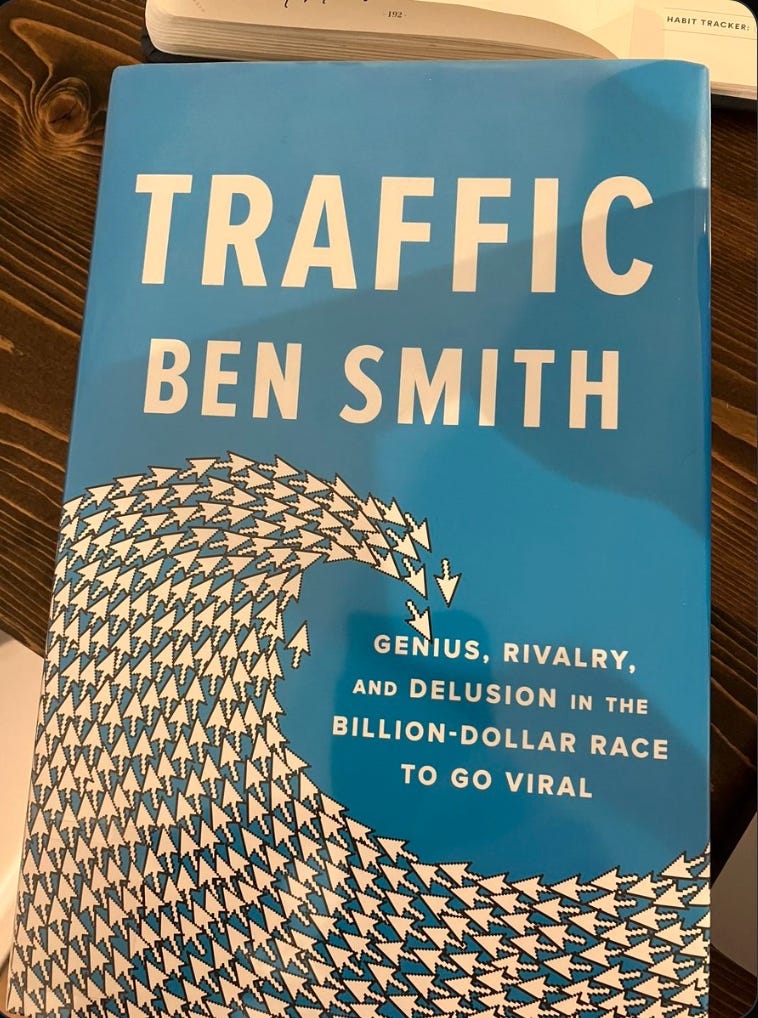Secrets of Buzzfeed/Gawker
& Notes on other things I've been into (MAY)
Reading: Traffic by Ben Smith.
The book tracks the rise (and semi-fall) of Buzzfeed + Gawker through the mid-00s to 2020ish.
As someone who writes on the Internet and has tried to make things go “viral” (not successfully) this is a great look at the workings of those businesses and their internal struggles.1
In true listicle style, here are a few notes/takeaways/ideas:
This book is about Buzzfeed and Gawker, but Gawker chased traffic more for gossip whereas Buzzfeed focused on identity and in a weird way, meaningful connection.
Sharing a Buzzfeed article meant you were sharing a slice of your personality/who you were
There’s a lot in there (they were part of overlapping scenes) but Jonah Peretti was originally called a “culture jammer” — like altering how people perceived and anticipated things.
In other words, Peretti was interested in how things went viral or got attention before the Internet and then applied it to the Internet.
Both were beholden to Google at first, then social media, especially Facebook traffic.
Google traffic started by searching for the news and “what time is the Super Bowl” type randomness, before shifting to “sharing”
Everyone chased Drudge; people are still chasing Drudge. Did you know the homepage has made its epic return (since 2019?)
Peretti was an early founder of HuffPost in the 00s. Though the front-facing homepage was focused on respectability and left-center politics a lot of their traffic came through other searches (like “sideboob”).
Peretti coined this the “mullet strategy”—business in the front, party in the pack
Right-wing traffic chaser Andrew Breitbart (Breitbart.com) started with Drudge, felt disrespected, wen to Huffington Post got in some spats, and then started his own thing
Gawker / Buzzfeed ran neck-and-neck for a while; the key differentiator was that Buzzfeed took venture capital money & Gawker didn’t.
Gawker was always going to be more niche than Buzzfeed
Buzzfeed was more shareable, Gawker was more embarrassing to share. They couldn’t scale in the same way
This book is well-researched, but has an insider perspective because Smith was the editor of Buzzfeed News, overseeing the “what color is this dress?” / let’s tie a bunch of rubber bands around a watermelon / Steele Dossier era
Disney almost bought Buzzfeed
Buzzfeed brought in a bunch of cash, but couldn’t meet its valuation, meaning they weren’t scaling as fast as they needed to
Buzzfeed <> Facebook were bosom buddies; FB really did favor Buzzfeed for a while and then it made a turn towards more right-wing stuff, according to the author, as FB made a clear decision to allow filter bubbles, because they were afraid of uniting too much of the world around singular pieces of content.
FB was actually scared of the reach of Buzzfeed for awhile
I listened to a podcast with Peretti, Nick Denton of Gawker, and Ben Smith. They described it as a “scene”
A “scene” seems accurate, it was like one last gasp before the individual YouTube creator economy really took hold
The book is well-written, not like a business book, but a narrative that builds chronologically while also poking at thorny issues and giving you an insider perspective
What I Learned:
Keep experimenting: Early on everything Buzzfeed did was an experiment — from its topics to its formatting to later videos. They stopped this in some ways, becoming too dependent on FB
Be nice: Gawker was insistent on exposing the most private & vile parts of people and it undid them
But critique is important: Feedback can still happen, powerful people can be held accountable
Growth at all costs is hard: Big money can give you lots of resources but can then create unrealistic expectations
Followers don’t equal an audience: Gimmicks can only last for so long; aim for more enduring value
Other Reading Stuff
The Every by Dave Eggers. This book is a few years old, not sure why it came to my attention here recently, except he has a new book out, maybe that’s why. It’s a continuation of our tech software hellscape, this time it’s like if Facebook + Amazon merged together.
Here’s a new podcast interview with Dave Eggers & Brad Listi.
Jason Diamond recently published his first piece in the New Yorker and it prompted him to reflect back on his writing journey. Excellent piece.
Alex Goldman from Reply All fame is on Substack now and this piece about what does and doesn’t make the cut journalistically was very enlightening. It really does depend on how much the sources agree to cooperate — and guess what? People change their minds a lot.
More notes on The Practice by Seth Godin
Watching
Last time I noted I wanted to watch Air and I did (in a theater, no less!) Great small story mostly in board rooms, but with a lot of will he/won’t he intrigue. Plus an impending deadline (Michael Jordans starting his season). Matt Damon and Ben Affleck were serviceable, really taking a regular script and making it better than your average TV show could. Also nice to watch a regular movie without a lot of crazy violence or sex. How novel. The music from the early 80s was great too.
May start The Sopranos? I’ve never seen it.
Rewatched The Hangover. We’re all familiar with it now, but the storytelling device of portraying their crazy night out as a mystery really does add some drama and intrigue instead of a movie of just straight-up partying
Still watching Succession + a lot of NBA basketball
Listening
Been into this new emo playlist, featuring a band called “Excuse Me Who Are You?”
Went to a Copeland show. They played an album that’s 20 years old
Random:
Take a look at this fake Wes Anderson Star Wars trailer and these fake Wes Anderson Nikes. It’s an amazing compliment to have such a distinctive style that everyone can copy it this precisely
Last Time
A lot of creators don't like their audience -- What's the way out?
Here’s an interesting tweet: Could these apply to you? Maybe you’ve bought a course on how to do X, hoping to make money from X, only to then not like X Maybe you thought about being known for X, because your friends/family/coworkers thought you’d be good at X, and it turns out you were good at X, and now you hate X
Last Thing
“There are no traffic jams on the extra mile.” — Zig Ziglar
Did you know about my novels?
Keep going,
Josh Spilker
Weird full disclosure: After reading this book, I decided to buy Buzzfeed (BZFD) stock. 50-something CENTS! LOL. Definitely not financial advice.





The current Vanity Fair has an excellent article about Disney and Buzzfeed that reads like episodes from Succession.